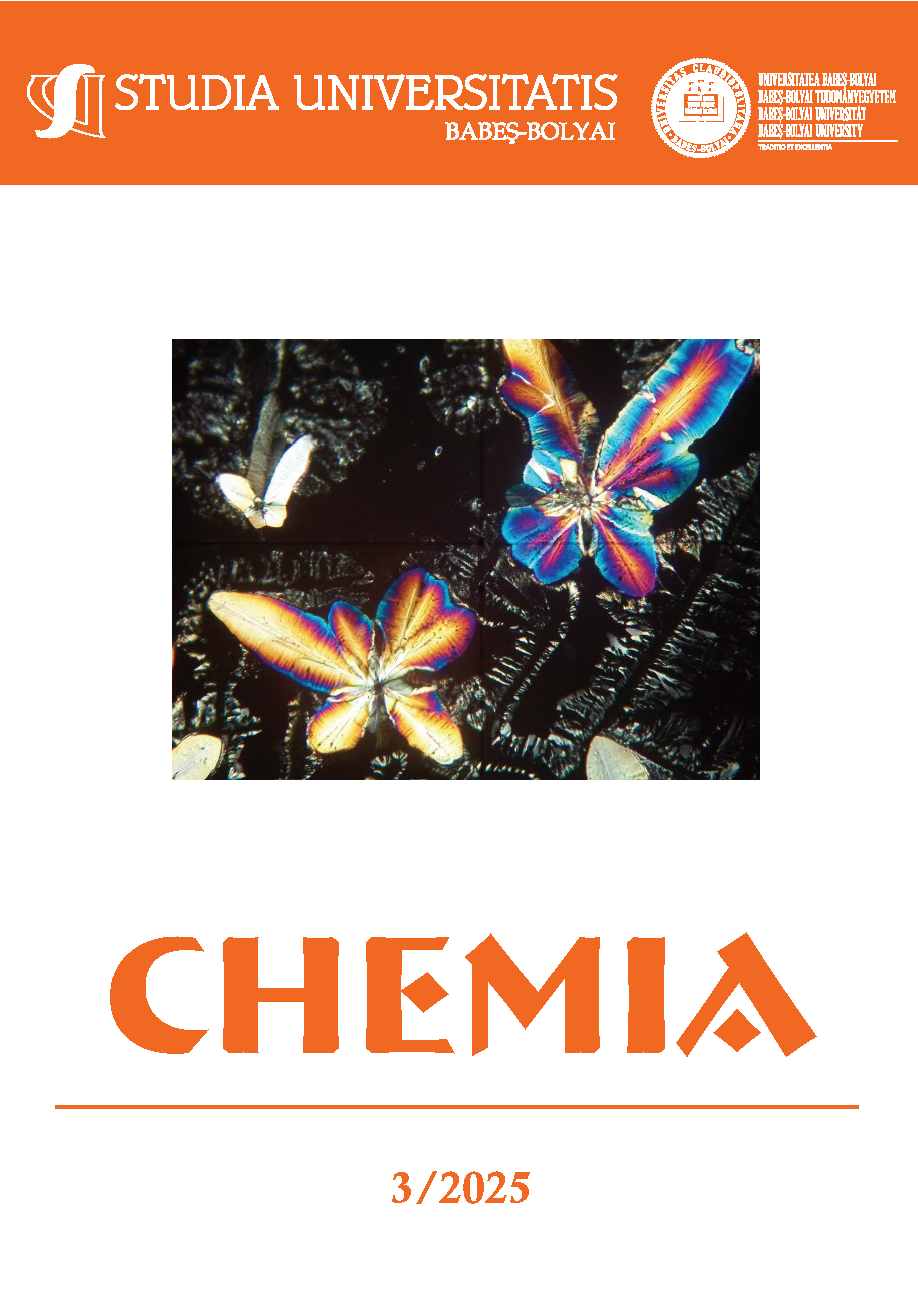PHYSICOCHEMICAL INVESTIGATION OF SOME GEOTHERMAL WATERS FROM SĂLAJ COUNTY, ROMANIA
DOI:
https://doi.org/10.24193/subbchem.2025.3.03Keywords:
Thermal water, mineral content, hardness, salinityAbstract
Geothermal waters solve minerals from the geological layers due to their increased temperature. These minerals affect water hardness and salinity. Therefore, thermal water samples were collected from spa pools springs in Sălaj County, Romania: Broscărie (Șimleul Silvaniei), Jibou and Boghis. The physicochemical measurement reveals that Jibou water has a higher electrical conductivity of 10580 µSi/cm, caused by the higher value of total dissolved solids (TDS) of 5264 mg/l. It is followed by the water collected from Broscărie, with an electrical conductivity of 1949 µSi/cm related to TDS of 1023 mg/l. The weaker mineralization was found in Boghis water, around 619 mg/l, corresponding to an electrical conductivity of 1200 µSi/cm. Water hardness is related to the amount of CaCO3. Boghis water is the hardest, containing 356 mg/l, followed by the samples collected from Broscărie, with 178 mg/l. The water collected from Jibou is the softest of all samples, with a CaCO3 amount of about 106.8 mg/l. The mineral distribution was assessed by mineralogical optical microscopy (MOM) and X ray diffraction (XRD). The results show that NaCl crystallized as halite is responsible for the samples’ salinity, while aragonite, magnesian calcite and calcite are the minerals which cause the water hardness. Hard thermal water containing Ca and Mg are effective for rheumatoid symptoms amelioration, while salted water is optimal for skin care.
References
1. X. Shi, X. Bai, Z. Sun, J. Liu, H. Ye, L. Pang, G. Chen, H. Yan, Geothermics, 2025, 131, 103402. https://doi.org/10.1016/j.geothermics.2025.103402
2. Y. Zheng, D. Nan, Z. Liu, C. Pubu, M. Zhu, H. Zhao, Y. Xing, S. Han, Q. Zeng, L. Zhang, Geothermics, 2025, 131, 103374. https://doi.org/10.1016/j.geothermics.2025.103374
3. L. Yuan, P. Shen, J. Zhang, J. Yang, X. Kong, Geothermics, 2025, 128, 103273. https://doi.org/10.1016/j.geothermics.2025.103273
4. Y. Jia, K. Li, L. Du, C. Zhu, F. Gao, L. Cui, Y. Shen, H. Fu, Water, 2025, 17, 1677. https://doi.org/10.3390/w17111677
5. B. Li, Q. Kong, F. Liao, G. Wang, F. Liu, L. Guo, C. Liu, Z. Shi, Geothermics, 2024, 119, 102931. https://doi.org/10.1016/j.geothermics.2024.102931
6. S.E. Avram, L. Rus, V. Micle, S.S. Hola, Water, 2022, 14(15), 2366. https://doi.org/10.3390/w14152366
7. L. Rus, S.E. Avram, V. Micle, Studia UBB Chemia, 2020, 65(2), 257. DOI:10.24193/subbchem.2020.2.21
8. C. Krézsek, A.W. Bally, Marine and Petroleum Geology, 2006, 23(4), 405-442. https://doi.org/10.1016/j.marpetgeo.2006.03.003
9. M. Venczel, I. Sabău, V. Codrea, Nymphaea, 2022, 48. 77-108.
10. V. Codrea, A. Hosu, The Paleocene-Eocene formations and the Eocene/ Oligocene boundary in the Jibou area, Field Trip Guide the 4th regional meeting of IFAA, 2001, 93-107.
11. M. Antics, M. Rosca, Geothermics, 2003, 32(4-6), 361-370. https://doi.org/10.1016/S0375-6505(03)00047-6
12. M. Zhong, B. Liu, J. Chen, G. Yan, Journal of Petroleum Science and Engineering, 2022, 218, 111040. https://doi.org/10.1016/j.petrol.2022.111040
13. J. Rohleder, E. Kroker, Calcium Carbonate: From the Cretaceous Period into the 21st Centruy, Springer Publishing House, 2001.
14. H. Xue, H., J. Qian, W. Xu, Minerals, 2025, 15, 717. https://doi.org/10.3390/min15070717
15. F. Armijo, F. Maraver, M. Pozo, M.I. Carretero, O. Armijo, M.A. Fernández-Torán, M.V. Fernández-González, I. Corvillo, Applied Clay Science, 2016, 126, 50-56, https://doi.org/10.1016/j.clay.2016.02.020
16. J. Walter, R. Chesnaux, V. Cloutier, D. Gaboury, Journal of Hydrology: Regional Studies, 2017, 13, 168-188. https://doi.org/10.1016/j.ejrh.2017.07.004
17. T.M. Peryt, Sedimentary Geology, 2006, 188–189, 379-396. https://doi.org/10.1016/j.sedgeo.2006.03.014
18. O. Gelencsér, A. Szakács, A., Gál, A. Szabo, Z. Dankházi, T. Tóth, D. Breitner, Zs. Szabó-Krausz, Cs. Szabó, Gy. Falus, Acta Geod Geophys, 2024, 59, 343–365. https://doi.org/10.1007/s40328-024-00436-z
19. R.Yuan, W. Zhang, H.Gan, F. Liu, S. Wei, L. Liu, Water 2022, 14, 2235. https://doi.org/10.3390/w14142235
20. S.E. Avram, D.V. Platon, L.B. Tudoran, G. Borodi, I. Petean, Appl. Sci., 2024, 14, 10806. https://doi.org/10.3390/app142310806
21. X. Zhu, P. Chang, J. Zhang, Y. Wang, S. Li, X. Lu, R. Wang, C-Q. Liu, H.H. Teng, Geochimica et Cosmochimica Acta, 2022, 339, 70-79. https://doi.org/10.1016/j.gca.2022.10.039
22. I. Petean, G. Arghir, R.F. Câmpean, M. Bărăian, A.G. Hosu Prack, Acta Technica Napocensis Series: Matematica Aplicata si Mecanica, 2011, 54, 2011,193 – 200.
23. S.E. Avram, B.V. Birle, L.B. Tudoran, G. Borodi, I. Petean, Water, 2024, 16, 1027. https://doi.org/10.3390/w16071027
24. S.E. Avram, B.V. Birle, C. Cosma, L.B. Tudoran, M. Moldovan, S.Cuc, G. Borodi, I. Petean, Materials, 2025, 18, 1715. https://doi.org/10.3390/ma18081715
25. M. Li, X. Wang, J. You, Y. Wang, M. Zhao, P. Sun, J. Fu, Y. Yu, K. Mao, Sustainability 2025, 17, 5988. https://doi.org/10.3390/su17135988
26. S. Paskucza, R. Carpa, A. Remizovschi, T. Rusu, Scientific Papers. Series E. Land Reclamation, Earth Observation & Surveying, Environmental Engineering, 2018, 7, 240-246.
27. A.P. Verhagen, S.M. Bierma-Zeinstra, M. Boers, J.R. Cardoso, J. Lambeck, R. de Bie, H.C. de Vet, Cochrane Database Syst Rev., 2015, 11 (4), CD000518. https://doi.org/10.1002/14651858.CD000518.pub2
28. H. Romay-Barrero,J. Herrero-López, J.A. Llorente-González, G. MelgarDel Corral, R. Palomo-Carrión, I. Martínez-Galán, Balneo and PRM Research Journal, 2022, 13(4): 527. https://doi.org/10.12680/balneo.2022.527
29. A. Huang, S. Seité, T. Adar, Clinics in Dermatology, 2018, 36, 363-368. https://doi.org/10.1016/j.clindermatol.2018.03.010
30. V. Milanković, J. Djuriš, A. Tubić, J. Agbaba, S. Forkapić, M. Lukić, RSC Advances, 2025, 15, 17755-17775. https://doi.org/10.1039/d5ra01252j
31. K. Wątor, Water Resources and Industry, 2024, 31, 100248. https://doi.org/10.1016/j.wri.2024.100248
32. M.V. Fernández-González, M.I. Carretero, J.M. Martín-García, A. Molinero-García, R. Delgado, Applied Clay Science, 2021, 202, 105969. https://doi.org/10.1016/j.clay.2020.105969
33. T. Barhoumi, I. Bekri-Abbes, E. Srasra, Comptes Rendus Chimie, 2019, 22, 126-131. https://doi.org/10.1016/j.crci.2018.11.006
34. G. Gerencsér, E. Murányi, K. Szendi, C. Varga, Applied Clay Science, 2010, 50, 47-50. https://doi.org/10.1016/j.clay.2010.06.022
35. M.T. Baschini, G.R. Pettinari, J.M. Vallés, C. Aguzzi, P. Cerezo, A. López-Galindo, M. Setti, C. Viseras, Applied Clay Science, 2010, 49, 205-212.
Downloads
Published
How to Cite
Issue
Section
License
Copyright (c) 2025 Studia Universitatis Babeș-Bolyai Chemia

This work is licensed under a Creative Commons Attribution-NonCommercial-NoDerivatives 4.0 International License.



